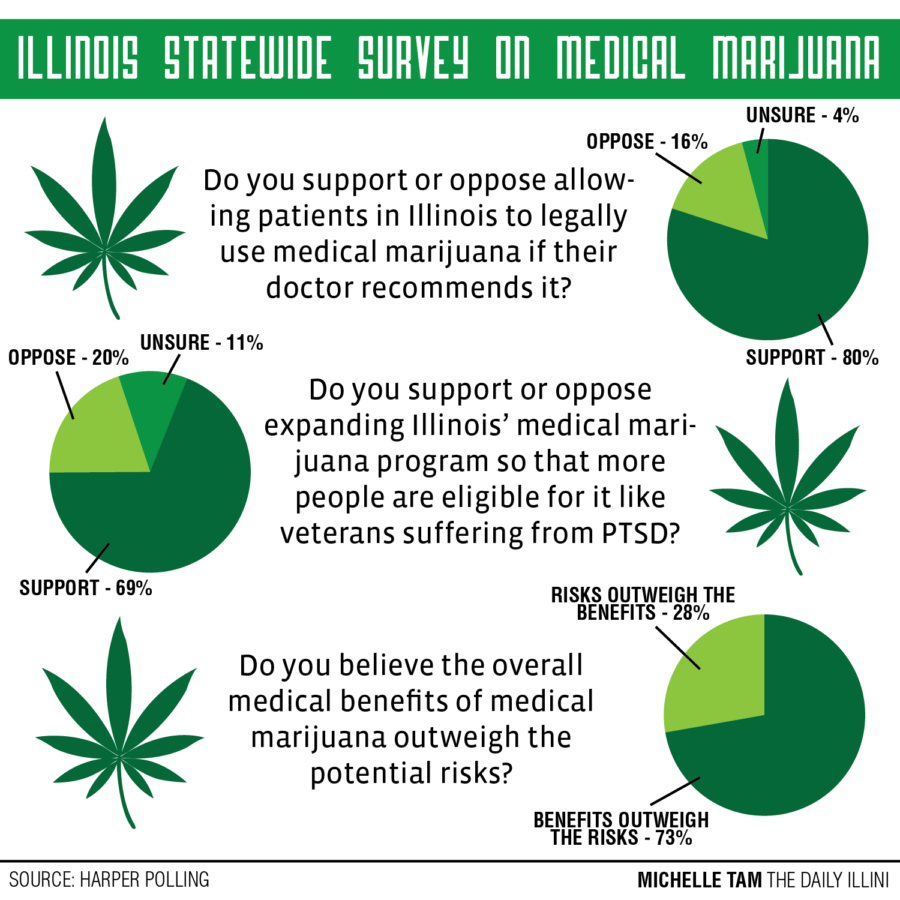Champaign medical cannabis dispensary prepares to open, eight conditions pending approval from Rauner
January 28, 2016
The body bags represented the estimated number of veterans who commit suicide everyday, according to the United States Department of Veteran Affairs; Medical Cannabis Outreach held a rally in Springfield urging Gov. Bruce Rauner to approve eight more conditions for the medical cannabis pilot program, including post traumatic stress disorder, autism and chronic pain syndrome.
The remaining five conditions are a series of chronic pain-related conditions including intractable pain, osteoarthritis, postoperative pain, pain due to trauma and irritable bowel syndrome.
Dan Linn, an executive director for The National Organization to Reform Marijuana Laws Illinois chapter, expected Rauner to approve the eight conditions on the day of the rally, but Rauner now has until Feb. 1 to rule on the conditions.
In September, Rauner rejected the Medical Cannabis Advisory Board’s recommendations for 11 conditions to be added to the program, including osteoarthritis and PTSD.
Get The Daily Illini in your inbox!
“We’re hoping that lawmakers will see that there is an overwhelming amount of support for extending this program, making it permanent and reforming our cannabis laws in a greater fashion,” Linn said prior to the rally.
A Champaign Connection
The rally coincided with the announcement of the first medical cannabis dispensary opening in Champaign. Currently under construction at 1704 S. Neil St. Suite C, Phoenix Botanical is expected to open sometime in March.
Phoenix Botanical consulted with Medical Cannabis Outreach to hold seminars prior to their opening, aimed at informing and registering potential patients. Medical Cannabis Outreach is hosting a seminar on Phoenix Botanical and how to obtain medical marijuana Feb. 7 at 10 a.m. in the Urbana Free Library.
Caprice Sweatt, founder and CEO of Medical Cannabis Outreach, said patients are often unsure of how to obtain medical cannabis. Often, the process is tougher than it appears.
“A lot of people are not aware that medical marijuana is legal in the state of Illinois and dispensaries are opening all around the state,” Sweatt said. “We get out there to let people know about the program, about the rules and regulations.”
For Sweatt, legalizing medical cannabis is a personal endeavor. Diagnosed with Crohn’s Disease at the age of 17, Sweatt credits marijuana with keeping her prescription drug-free for the past 25 years.
“There is a prescription drug epidemic in the United States right now,” Sweatt said. “So, we’re trying to encourage people to take a look at medical cannabis (instead of) prescription drugs and narcotics.”
Obtaining a Dispensary License
Phoenix Botanical has yet to receive its medical dispensary license from the state.
However, Sweatt said the way the process works, they expect to obtain their license during their final inspection in the next couple of weeks.
Sweatt said she understands the confusion surrounding procedures to obtain a dispensary license.
“This whole industry is strange,” Sweatt said. “There is not anything that follows what normal business practices would be, so we have completely different regulations we have to follow.”
Widespread Support
According to a new statewide medical marijuana survey conducted by Harper Polling, 80 percent of Illinois residents support the use of medical marijuana as a doctor recommended treatment.
Notably, the survey shows bipartisan support for this movement. Sixty-six percent of Republicans, 87 percent of Democrats and 82 percent of Independents supported legalization.
As of January 2016, 23 states have legalized medical marijuana in some capacity.
Current University policy prohibits prescribed medical marijuana possession in University-owned buildings, including University Housing.







